 Search by Keyword
Sign Up Below for our MONTHLY BEATLES TRIVIA QUIZ!
|
"IF I FELL"
(John Lennon - Paul McCartney)
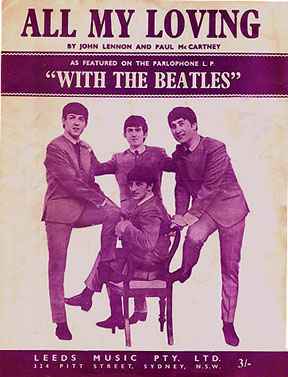 The innocence of '60s pop music was reflected in The Beatles' songwriting in the early '60s. "All My Loving," "Love Me Do," "From Me To You," "I Saw Her Standing There" and "I Want To Hold Your Hand" are among the endless examples of early Lennon / McCartney songs that emulated the innocence of the times. Seeing an attractive girl from across the dance floor, having 'arms that long to hold her' and desiring to 'hold her hand' were all within the acceptable "bounds" of the pop music world at the time. The innocence of '60s pop music was reflected in The Beatles' songwriting in the early '60s. "All My Loving," "Love Me Do," "From Me To You," "I Saw Her Standing There" and "I Want To Hold Your Hand" are among the endless examples of early Lennon / McCartney songs that emulated the innocence of the times. Seeing an attractive girl from across the dance floor, having 'arms that long to hold her' and desiring to 'hold her hand' were all within the acceptable "bounds" of the pop music world at the time.
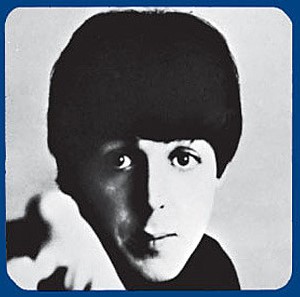 But as we now know, The Beatles would not stay within acceptable "bounds" for too long. They soon were known for breaking down the barriers and extending the limits of what their audience would approve. For an example, how would their fans and critics react to breaking away from the "boy meets girl" scenario to delve into a depiction of a "love triangle"? But as we now know, The Beatles would not stay within acceptable "bounds" for too long. They soon were known for breaking down the barriers and extending the limits of what their audience would approve. For an example, how would their fans and critics react to breaking away from the "boy meets girl" scenario to delve into a depiction of a "love triangle"?
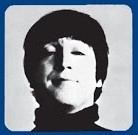 As the married and world-experienced Beatle, Lennon was doing little more than lowering himself somewhat to crank out what he thought of as meaningless dribble in order to further a career and also please the masses. In 1971, John related: "I'd have a separate 'songwriting' John Lennon who wrote songs for the meat market and I didn't consider them, the lyrics or anything, to contain any depth at all." As the married and world-experienced Beatle, Lennon was doing little more than lowering himself somewhat to crank out what he thought of as meaningless dribble in order to further a career and also please the masses. In 1971, John related: "I'd have a separate 'songwriting' John Lennon who wrote songs for the meat market and I didn't consider them, the lyrics or anything, to contain any depth at all."
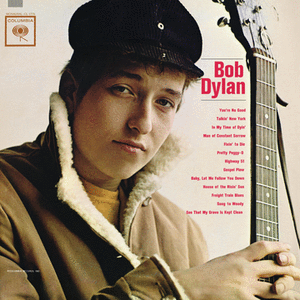 Possibly because of John's recent infatuation with Bob Dylan, he began to experiment with lyric writing that was more expressive and even "semi-autobiographical" as he described the ballad "If I Fell." This song's lyrical twists, involving the contemplation of entering into a second relationship while still involved with someone else, was quite risky to say the least, especially for the music climate in 1964. But The Beatles, especially John Lennon, made it a habit to take risks lyrically throughout their career. This was arguably one of the first. Possibly because of John's recent infatuation with Bob Dylan, he began to experiment with lyric writing that was more expressive and even "semi-autobiographical" as he described the ballad "If I Fell." This song's lyrical twists, involving the contemplation of entering into a second relationship while still involved with someone else, was quite risky to say the least, especially for the music climate in 1964. But The Beatles, especially John Lennon, made it a habit to take risks lyrically throughout their career. This was arguably one of the first.
Songwriting History
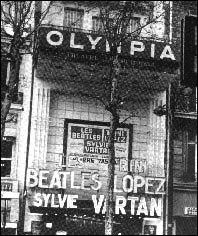 Between January 15th and February 4th, 1964, the band was staying at the exclusive George V Hotel in Paris, France during their live concert series at the Olympia Theatre. Knowing that their upcoming movie would be needing new original material, they had an upright piano brought into the room strictly for the purpose of writing these songs. Because of the intricate nature of the song, "If I Fell" is thought to have been written during their stay here. Between January 15th and February 4th, 1964, the band was staying at the exclusive George V Hotel in Paris, France during their live concert series at the Olympia Theatre. Knowing that their upcoming movie would be needing new original material, they had an upright piano brought into the room strictly for the purpose of writing these songs. Because of the intricate nature of the song, "If I Fell" is thought to have been written during their stay here.
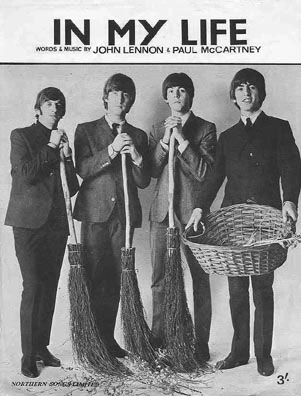 "That was my first attempt at a ballad proper," explained John in 1980. "That was the precursor to 'In My Life.' It shows that I wrote sentimental love ballads, or silly love songs, way back then." "That was my first attempt at a ballad proper," explained John in 1980. "That was the precursor to 'In My Life.' It shows that I wrote sentimental love ballads, or silly love songs, way back then."
In McCartney's 1997 book "Many Years From Now," he adds some flattering comments regarding the song as well as Lennon's songwriting. "People forget that John wrote some pretty nice ballads. People tend to think of him as an acerbic wit and aggressive and abrasive, but he did have a very warm side to him really which he didn't like to show too much in case he got rejected."
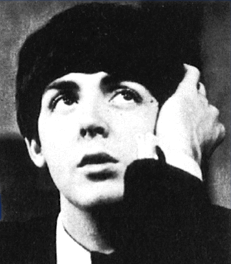 Paul then cleared up the songwriting credit for the song. "We wrote 'If I Fell' together but with the emphasis on John because he sang it. It was a nice harmony number, very much a ballad." McCartney elaborated further, "This was our close-harmony period." Paul then cleared up the songwriting credit for the song. "We wrote 'If I Fell' together but with the emphasis on John because he sang it. It was a nice harmony number, very much a ballad." McCartney elaborated further, "This was our close-harmony period."
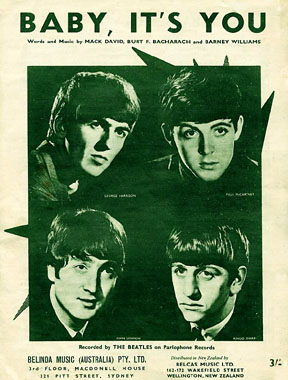 An early demo recording has surfaced of John playing acoustic guitar and singing "If I Fell" (detailed below), undoubtedly just after he and Paul finished writing the song together. While nearly all of the familiar lyrics are already in place at this time, one interesting feature is Lennon's "ah-ah-ah" that closes each bridge, which is very similar to his "uh-oh" from their cover of The Shirelles' 1962 hit "Baby It's You." Of course, this vocal inflection was dropped before the song was officially recorded at EMI Studios on February 27th, 1964. An early demo recording has surfaced of John playing acoustic guitar and singing "If I Fell" (detailed below), undoubtedly just after he and Paul finished writing the song together. While nearly all of the familiar lyrics are already in place at this time, one interesting feature is Lennon's "ah-ah-ah" that closes each bridge, which is very similar to his "uh-oh" from their cover of The Shirelles' 1962 hit "Baby It's You." Of course, this vocal inflection was dropped before the song was officially recorded at EMI Studios on February 27th, 1964.
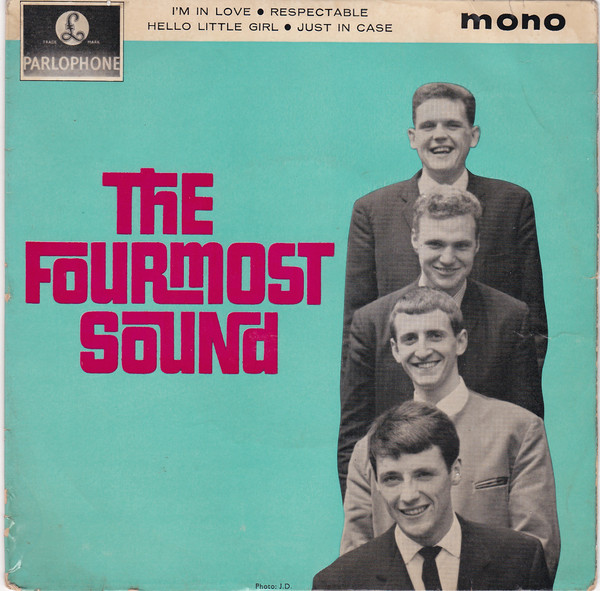 Other than the implied inspiration of Bob Dylan in respect to the song's introspective lyrics, Paul hints at another possible influence when he was interviewed in 1984. "We did a few songs...'This Boy,' 'If I Fell,' 'Yes It Is'...in this same vein, kind of like The Fourmost, an English vocal group, but not really." Other than the implied inspiration of Bob Dylan in respect to the song's introspective lyrics, Paul hints at another possible influence when he was interviewed in 1984. "We did a few songs...'This Boy,' 'If I Fell,' 'Yes It Is'...in this same vein, kind of like The Fourmost, an English vocal group, but not really."
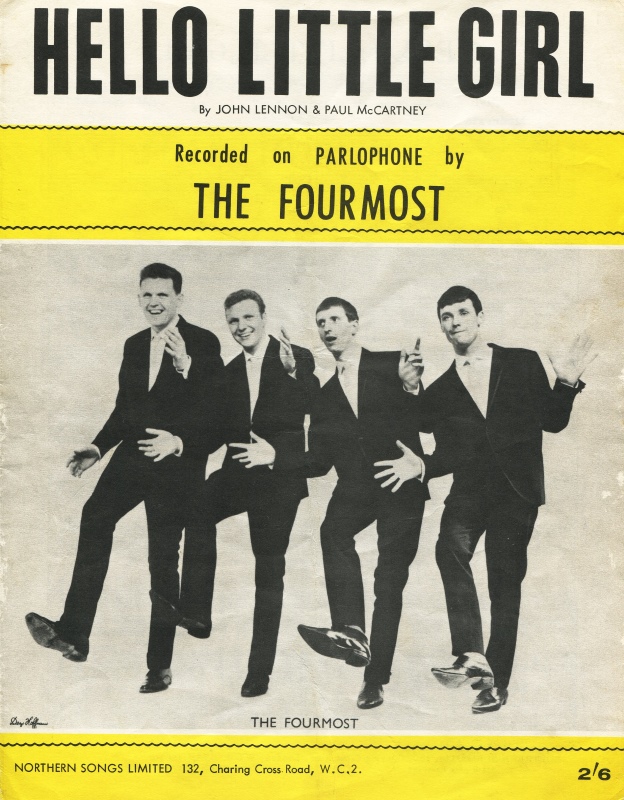 The Fourmost were a four-piece band from Liverpool that had their start roughly around the same time as The Beatles, even premiering at the Cavern Club about three weeks before The Beatles did. The Fourmost ended up in the Brian Epstein stable of British groups signed to Parlophone Records and working with George Martin as producer. They began their successful British career by recording the very early Lennon / McCartney songs "Hello Little Girl" and "I'm In Love," these recordings highlighting their tight-knit vocal harmonies. The Fourmost were a four-piece band from Liverpool that had their start roughly around the same time as The Beatles, even premiering at the Cavern Club about three weeks before The Beatles did. The Fourmost ended up in the Brian Epstein stable of British groups signed to Parlophone Records and working with George Martin as producer. They began their successful British career by recording the very early Lennon / McCartney songs "Hello Little Girl" and "I'm In Love," these recordings highlighting their tight-knit vocal harmonies.
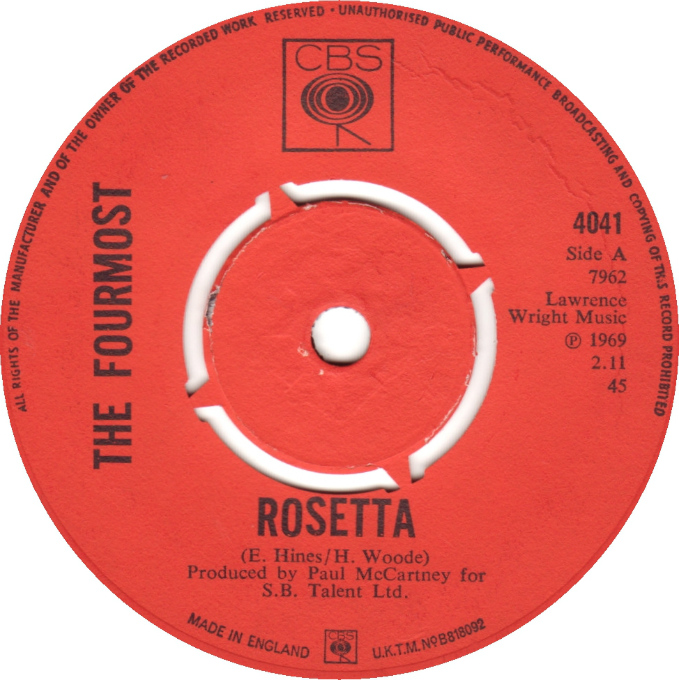 Having had two Top 20 British hits by that time, and because of their being contemporaries of The Beatles, the vocal stylings of The Fourmost may very well have had, at least to a small degree, an impact on the harmonic style used in the writing of Lennon and McCartney in January of 1964. At the very least, a friendship continued between the two groups to the point of Paul suggesting that they record the song "Rosetta" in 1968 for which he produced and played piano. Having had two Top 20 British hits by that time, and because of their being contemporaries of The Beatles, the vocal stylings of The Fourmost may very well have had, at least to a small degree, an impact on the harmonic style used in the writing of Lennon and McCartney in January of 1964. At the very least, a friendship continued between the two groups to the point of Paul suggesting that they record the song "Rosetta" in 1968 for which he produced and played piano.
Recording History
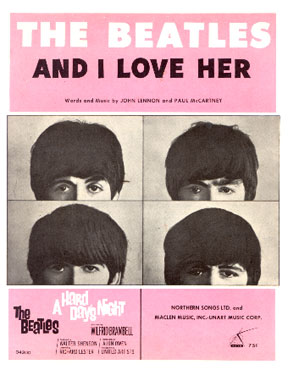 Sometime during January or February of 1964, John Lennon recorded a primitive home demo of "If I Fell" by himself on acoustic guitar and vocal (as mentioned above). This demo tape revelas Lennon going through segments of the song three times, rehearsing his vocal part in many octaves in order to choose which would be best for their official EMI recording session, which apparently was very soon. Sometime during January or February of 1964, John Lennon recorded a primitive home demo of "If I Fell" by himself on acoustic guitar and vocal (as mentioned above). This demo tape revelas Lennon going through segments of the song three times, rehearsing his vocal part in many octaves in order to choose which would be best for their official EMI recording session, which apparently was very soon.
February 27th, 1964, the group's third day in a row of recording in EMI Studio Two for their first motion picture, was a very productive one. The morning session finally brought Paul's "And I Love Her" to completion as well as starting and completing John's "Tell Me Why." The second session, which ran from 2:30 to 5:30, saw the song "If I Fell" from beginning to end as well.
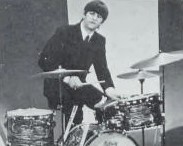 This three hour session consisted of 15 takes of "If I Fell," the group playing their usual instruments while singing at the same time. Lennon's acoustic guitar, McCartney's bass and Ringo's drums were on track one of the four-track tape, Harrison's 12-string electric guitar was on track two, and John and Paul's vocals were both recorded onto track three. In order to acheive the feel that they wanted, John and Paul insisted on performing their intricate harmonies together at the same time into one microphone, facing each other with the mic set to a figure-of-eight pattern. "While the earlier takes were being recorded," explained Kevin Howlett in the liner notes of Anthology 4," "John and Paul experimented with singing at different distances from the mic to achieve the best sound balance between their voices." This three hour session consisted of 15 takes of "If I Fell," the group playing their usual instruments while singing at the same time. Lennon's acoustic guitar, McCartney's bass and Ringo's drums were on track one of the four-track tape, Harrison's 12-string electric guitar was on track two, and John and Paul's vocals were both recorded onto track three. In order to acheive the feel that they wanted, John and Paul insisted on performing their intricate harmonies together at the same time into one microphone, facing each other with the mic set to a figure-of-eight pattern. "While the earlier takes were being recorded," explained Kevin Howlett in the liner notes of Anthology 4," "John and Paul experimented with singing at different distances from the mic to achieve the best sound balance between their voices."
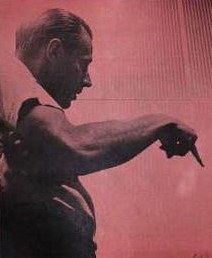 The song did evolve as the takes went on, such as Ringo's heavier drum sound that started with "take three," this being suggested by producer George Martin. Apparently John had "an itchy bum" by the conclusion of "take nine," because he made sure to capture this statement on tape. The song did evolve as the takes went on, such as Ringo's heavier drum sound that started with "take three," this being suggested by producer George Martin. Apparently John had "an itchy bum" by the conclusion of "take nine," because he made sure to capture this statement on tape.
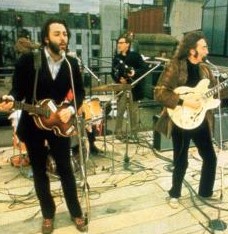 After George Martin calls out "take 11," Paul can be heard practicing his concluding vocal harmony while George Harrison practiced his final guitar phrasing as was suggested by their producer. To get the recording going, Lennon exclaimed, "We're on the air, folks!" because George was still practicing his guitar ending, John complaining "C'mon!" It is on this take that Lennon began adding his punchy acoustic guitar introduction, which he performed here by gently slapping the strings with his right hand in an eighth-note pattern while forming the chords with his left hand (similar to what he did five years later during the intro to "Get Back"). John is interrupted by someone after the first measure and, after somebody coughed, he began again. Other than his beginning snare drum fill, Ringo switched over to rim shots on his snare drum and didn't deviate from his 4/4 pattern throughout the whole song, the drummer adding a couple drum fills in later takes. George hadn't added his small guitar riff in-between verses one and two yet either. Lennon accidentally sang the song's concluding line "If I fell in love with you" at the beginning of the second bridge, which prompted him to react with "ooohhh," thinking this take would not be usable. They completed this take anyway, George debuting (but flubbing) his distinctive 12-string guitar run at the end of the song. "Something like that, you mean?" asked Harrison at the end of the take (probably to George Martin). After George Martin calls out "take 11," Paul can be heard practicing his concluding vocal harmony while George Harrison practiced his final guitar phrasing as was suggested by their producer. To get the recording going, Lennon exclaimed, "We're on the air, folks!" because George was still practicing his guitar ending, John complaining "C'mon!" It is on this take that Lennon began adding his punchy acoustic guitar introduction, which he performed here by gently slapping the strings with his right hand in an eighth-note pattern while forming the chords with his left hand (similar to what he did five years later during the intro to "Get Back"). John is interrupted by someone after the first measure and, after somebody coughed, he began again. Other than his beginning snare drum fill, Ringo switched over to rim shots on his snare drum and didn't deviate from his 4/4 pattern throughout the whole song, the drummer adding a couple drum fills in later takes. George hadn't added his small guitar riff in-between verses one and two yet either. Lennon accidentally sang the song's concluding line "If I fell in love with you" at the beginning of the second bridge, which prompted him to react with "ooohhh," thinking this take would not be usable. They completed this take anyway, George debuting (but flubbing) his distinctive 12-string guitar run at the end of the song. "Something like that, you mean?" asked Harrison at the end of the take (probably to George Martin).
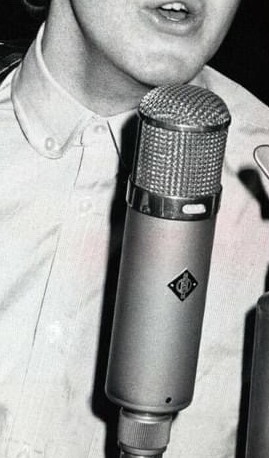 "Take 15" ended up being the acceptable take of the song, Lennon changing to strumming his acoustic guitar by this point. However, this final take contained a semi-serious flaw at the end of the second bridge. Paul's voice cracked on the word "vain" to the point that this extremely high note actually cut off. This was easily fixed by double-tracking another vocal part as an overdub for that part of the song. Lennon also double-tracked his vocals throughout the entire song, which gives their two-part harmony a rich and full sound. John and Paul's overdubbed vocals were captured on track four of the four-track tape. "Take 15" ended up being the acceptable take of the song, Lennon changing to strumming his acoustic guitar by this point. However, this final take contained a semi-serious flaw at the end of the second bridge. Paul's voice cracked on the word "vain" to the point that this extremely high note actually cut off. This was easily fixed by double-tracking another vocal part as an overdub for that part of the song. Lennon also double-tracked his vocals throughout the entire song, which gives their two-part harmony a rich and full sound. John and Paul's overdubbed vocals were captured on track four of the four-track tape.
 On March 3rd, 1964, George Martin and engineers Norman Smith and A.B. Lincoln got together in the control room of EMI Studio One to create mono mixes for all the tracks to be included in their first movie "A Hard Day's Night." When they did the mix for "If I Fell," they kept John's vocal in the introduction single-tracked to create an intimate feel. When Paul's vocals begin with the first verse, John's double-tracked vocals kick in and remain intact for the remainder of the song. They were also careful to make sure Paul's double-tracked vocals were in place for his flub at the end of the second bridge. On March 3rd, 1964, George Martin and engineers Norman Smith and A.B. Lincoln got together in the control room of EMI Studio One to create mono mixes for all the tracks to be included in their first movie "A Hard Day's Night." When they did the mix for "If I Fell," they kept John's vocal in the introduction single-tracked to create an intimate feel. When Paul's vocals begin with the first verse, John's double-tracked vocals kick in and remain intact for the remainder of the song. They were also careful to make sure Paul's double-tracked vocals were in place for his flub at the end of the second bridge.
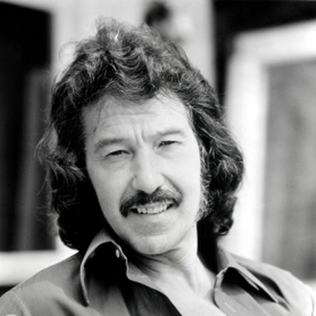 George Martin, Norman Smith and 2nd engineer Ken Scott gathered in the control room of EMI Studio Three on June 9th, 1964, to create mono tape copies of the soundtrack songs (including "If I Fell") for distribution to both American record labels that would be releasing them. United Artists Records included the song on the soundtrack album, and Capitol Records released it as a single as well as on their album "Something New." George Martin, Norman Smith and 2nd engineer Ken Scott gathered in the control room of EMI Studio Three on June 9th, 1964, to create mono tape copies of the soundtrack songs (including "If I Fell") for distribution to both American record labels that would be releasing them. United Artists Records included the song on the soundtrack album, and Capitol Records released it as a single as well as on their album "Something New."
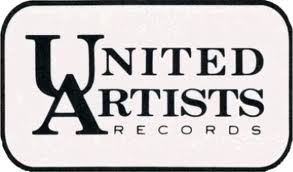 June 22nd, 1964 was the day that the stereo mixes were created for the songs on the UK "A Hard Day's Night" album, these stereo mixes also being sent to Capitol Records for release on their "Something New" LP. Since United Artists decided to rush release their soundtrack album, they only had the mono mixes in time for its release on June 26th, 1964. George Martin, Norman Smith and 2nd engineer Geoff Emerick were the only ones present in the control room of EMI Studio One on this day for this marathon session. June 22nd, 1964 was the day that the stereo mixes were created for the songs on the UK "A Hard Day's Night" album, these stereo mixes also being sent to Capitol Records for release on their "Something New" LP. Since United Artists decided to rush release their soundtrack album, they only had the mono mixes in time for its release on June 26th, 1964. George Martin, Norman Smith and 2nd engineer Geoff Emerick were the only ones present in the control room of EMI Studio One on this day for this marathon session.
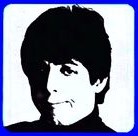 Less care was taken for this stereo mix than had been achieved for the previous mono mix back in March. They let the double-tracking of Lennon's voice be heard even during the intro, which has a somewhat out-of-sync start. They also neglected to correct Paul's vocal flub in the second bridge, so anyone who spent a dollar more for the stereo version of either the American or British LP got to hear Paul's voice crack embarrassingly towards the end of the song. Less care was taken for this stereo mix than had been achieved for the previous mono mix back in March. They let the double-tracking of Lennon's voice be heard even during the intro, which has a somewhat out-of-sync start. They also neglected to correct Paul's vocal flub in the second bridge, so anyone who spent a dollar more for the stereo version of either the American or British LP got to hear Paul's voice crack embarrassingly towards the end of the song.
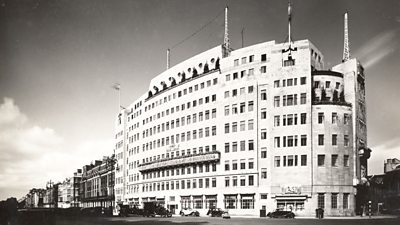 The Beatles then brought "If I Fell" to a recording studio two more times, these being specifically for BBC radio. The first time was on July 14th, 1964 in Studios B7/S2 of London's famous Broadcasting House between 7 and 11 pm for the first edition of a new radio show entitled "Top Gear," which was produced by Bernie Andrews and broadcast on July 16th between 10 and 11:55 pm. Then they recorded the song a second time for the BBC on July 17th, 1964 at BBC Paris Studio in London between 2:15 and 6:15 pm for the fourth edition of their show "From Us To You," which was produced by Bryant Marriott and broadcast on August 3rd between 10 am and 12 noon. The Beatles then brought "If I Fell" to a recording studio two more times, these being specifically for BBC radio. The first time was on July 14th, 1964 in Studios B7/S2 of London's famous Broadcasting House between 7 and 11 pm for the first edition of a new radio show entitled "Top Gear," which was produced by Bernie Andrews and broadcast on July 16th between 10 and 11:55 pm. Then they recorded the song a second time for the BBC on July 17th, 1964 at BBC Paris Studio in London between 2:15 and 6:15 pm for the fourth edition of their show "From Us To You," which was produced by Bryant Marriott and broadcast on August 3rd between 10 am and 12 noon.
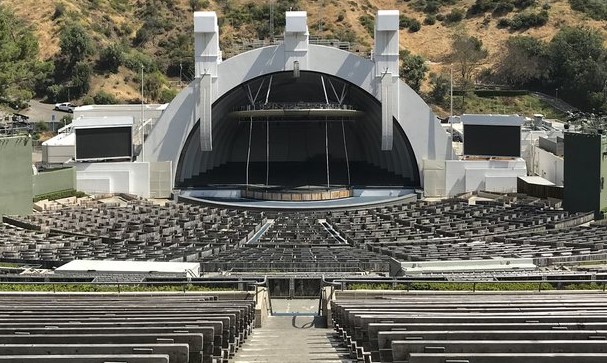 A final recording session for "If I Fell" can be said to have occurred at the Hollywood Bowl in Los Angeles, California back on August 23rd, 1964. This performance was recorded for the intention of release as a live album by Capitol Records in America in late 1964. The producers for this event were Capitol vice-president Voyle Gilmore and George Martin with Hugh Davies as engineer. A rough stereo mix of the show was made on August 27th by Voyle Gilmore and Hugh Davies, adding equalization, reverb and limiting. A final recording session for "If I Fell" can be said to have occurred at the Hollywood Bowl in Los Angeles, California back on August 23rd, 1964. This performance was recorded for the intention of release as a live album by Capitol Records in America in late 1964. The producers for this event were Capitol vice-president Voyle Gilmore and George Martin with Hugh Davies as engineer. A rough stereo mix of the show was made on August 27th by Voyle Gilmore and Hugh Davies, adding equalization, reverb and limiting.
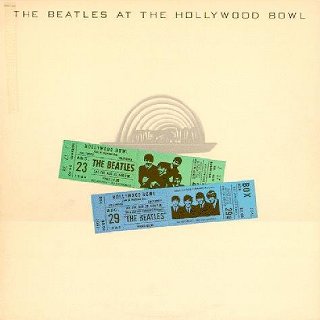 Despite their hard work, the album was rejected for release because of the bad quality of the recording. The tapes resurfaced in 1977 and, combined with a recording of a 1965 Hollywood Bowl concert, were released as the successful album "The Beatles At The Hollywood Bowl." Unfortunately, this concert performance of "If I Fell" was not deemed suitable for inclusion on this 1977 release nor on the album's reissue in 2016 and remains in the vaults to this day. Despite their hard work, the album was rejected for release because of the bad quality of the recording. The tapes resurfaced in 1977 and, combined with a recording of a 1965 Hollywood Bowl concert, were released as the successful album "The Beatles At The Hollywood Bowl." Unfortunately, this concert performance of "If I Fell" was not deemed suitable for inclusion on this 1977 release nor on the album's reissue in 2016 and remains in the vaults to this day.
Sometime in 2025, producer Giles Martin, with engineers Joe Wyatt and Greg McAllister, created a mix of "take 11" of the original EMI sessions of "If I Fell" for inclusion on "Anthology 4," this being released in various editions in 2025 as detailed below.
Song Structure and Style
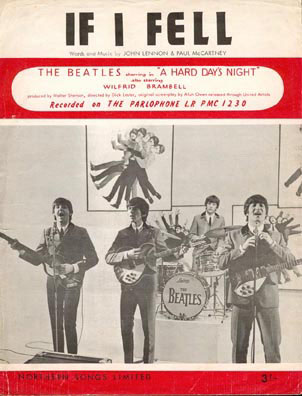 Structurally and lyrically, the listener is witnessing an early manifestation of the mature intricacies that will consume the Lennon/McCartney catalog in later years, such as in 1967's "Sgt. Pepper" album. Anyone paying attention in 1964 was in denial if they hadn't admitted to being impressed by the complexity displayed in "If I Fell." Structurally and lyrically, the listener is witnessing an early manifestation of the mature intricacies that will consume the Lennon/McCartney catalog in later years, such as in 1967's "Sgt. Pepper" album. Anyone paying attention in 1964 was in denial if they hadn't admitted to being impressed by the complexity displayed in "If I Fell."
As discussed in our review of "Not A Second Time," music critic William Mann of the London Times stated the following way back in 1963 about the songwriting style of John Lennon and Paul McCartney: "One gets the impression that they think simultaneously of harmony and melody, so firmly are the major tonic sevenths and ninths built into their tunes." Although this article was written in advance of "If I Fell," this song is arguably the best example of what William Mann was making reference to.
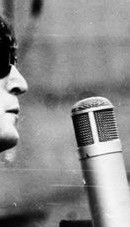 When examining the melody lines that each individually sing in this song, you will notice that they interweave throughout, jumping, diving and even singing in unison in strategic places. John's melody line may rise while Paul's will fall and vice-versa while McCartney still retains his usual higher register. While their usual harmony work shows the lower register as the actual melody line and the higher one being the harmony, one cannot tell which is which in this case. They both actually could be identified as such. When examining the melody lines that each individually sing in this song, you will notice that they interweave throughout, jumping, diving and even singing in unison in strategic places. John's melody line may rise while Paul's will fall and vice-versa while McCartney still retains his usual higher register. While their usual harmony work shows the lower register as the actual melody line and the higher one being the harmony, one cannot tell which is which in this case. They both actually could be identified as such.
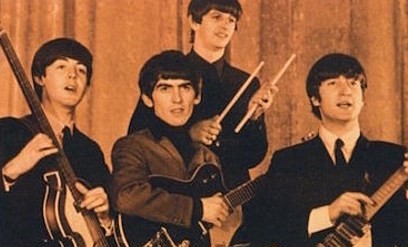 Nonetheless, the actual format used in the song follows their usual verse/ verse/ bridge/ verse structure (or aaba) along with very interesting twists. After an introduction and first verse, we see an abbreviated second verse which segues midway through a lyric line into the bridge. A final verse is also abbreviated to create another segue into the repeated bridge and then back to the third verse, which falls back to the home key before resolving into a short conclusion. Let's try to break it down in order to clear things up (or attempt to). Nonetheless, the actual format used in the song follows their usual verse/ verse/ bridge/ verse structure (or aaba) along with very interesting twists. After an introduction and first verse, we see an abbreviated second verse which segues midway through a lyric line into the bridge. A final verse is also abbreviated to create another segue into the repeated bridge and then back to the third verse, which falls back to the home key before resolving into a short conclusion. Let's try to break it down in order to clear things up (or attempt to).
 First of all, there is an eight measure intro that is not even hinted at elsewhere in the song, this starting with an E-flat-minor chord. From here the intro goes through a series of disorienting chord changes that conceal what the root key of the song is. Finally, by the seventh and eighth measure, the listener finds his footing by seeing the transition to the key of D-major in the first verse. The purpose of this intro is for Lennon to intimately set the stage lyrically for what concerns him storyline-wise. First of all, there is an eight measure intro that is not even hinted at elsewhere in the song, this starting with an E-flat-minor chord. From here the intro goes through a series of disorienting chord changes that conceal what the root key of the song is. Finally, by the seventh and eighth measure, the listener finds his footing by seeing the transition to the key of D-major in the first verse. The purpose of this intro is for Lennon to intimately set the stage lyrically for what concerns him storyline-wise.
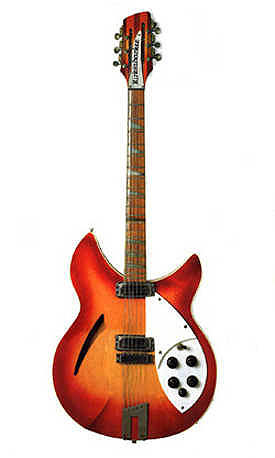 Instrumentally, the sparse arrangement heard in the introduction consists merely of Lennon's acoustic rhythm guitar along with Harrison's guitar strums on the first beat of each measure. This continues on until the eighth measure where Ringo performs an introductory drum fill to get the actual song into gear. Instrumentally, the sparse arrangement heard in the introduction consists merely of Lennon's acoustic rhythm guitar along with Harrison's guitar strums on the first beat of each measure. This continues on until the eighth measure where Ringo performs an introductory drum fill to get the actual song into gear.
When the ten-measure first verse begins, we hear the arrival of McCartney's bass and harmonized vocals along with Harrison's plucking Rickenbacker 12-string guitar phrases with Starr's rim-shot drum beat. Both the fourth and the eighth measures are primarily taken up by unison singing from John and Paul to add a nice variation within the otherwise harmonized verse. The first eight measures comprise the actual verse, while an additional two measures are needed as a transition into a second verse.
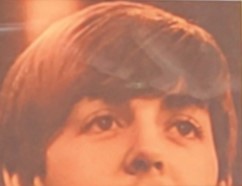 The second verse is identical in structure, but is cut off after the eighth measure in mid-sentence in order to then abruptly jump right into a seven measure bridge. This bridge, which is sung completely in harmony, is divided into two sections: the first consisting of three measures, which completes the melodic phrase that was started at the end of the previous verse, and the second section consisting of the remaining four measures to encompass a second melodic phrase. Are you still with me? The second verse is identical in structure, but is cut off after the eighth measure in mid-sentence in order to then abruptly jump right into a seven measure bridge. This bridge, which is sung completely in harmony, is divided into two sections: the first consisting of three measures, which completes the melodic phrase that was started at the end of the previous verse, and the second section consisting of the remaining four measures to encompass a second melodic phrase. Are you still with me?
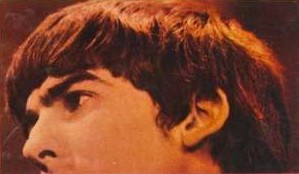 A third verse then appears, this being structurally identical to the second verse because of its natural segue into a repeat of the bridge (this one featuring McCartney's cracking vocal line at the end). After this bridge, we repeat the third verse, but this time it stretches to thirteen measures to include a fitting conclusion to the song, complete with Harrison's simple but appropriate guitar fill. A third verse then appears, this being structurally identical to the second verse because of its natural segue into a repeat of the bridge (this one featuring McCartney's cracking vocal line at the end). After this bridge, we repeat the third verse, but this time it stretches to thirteen measures to include a fitting conclusion to the song, complete with Harrison's simple but appropriate guitar fill.
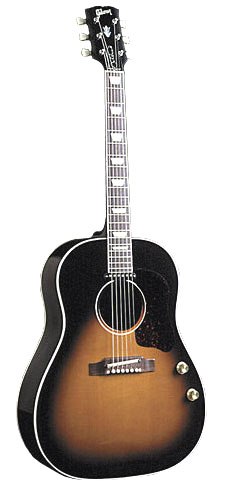 Lennon shows unusually outstanding vocal control for singing such a winding melody line up against McCartney's prominent higher melody line. John is also playing the singer-songwriter role extremely well, his Gibson acoustic rhythm guitar being his "tool of the trade" for this song. Lennon shows unusually outstanding vocal control for singing such a winding melody line up against McCartney's prominent higher melody line. John is also playing the singer-songwriter role extremely well, his Gibson acoustic rhythm guitar being his "tool of the trade" for this song.
McCartney's strong-suit here is his spot-on vocal performance in the highest possible register he can muster, so we all should easily forgive him for his cracking voice in the second bridge. Paul's bass work is perfunctory but suitable, keeping primarily to the chord changes.
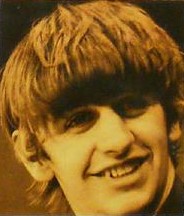 George's 12-string Rickenbacker is proudly displayed throughout, adding a distinctiveness that definitely elevates the song above the otherwise simplicity of his sound in 1963. Ringo, once again, falls into the background nicely with his subdued rim-shot beat and simple occasional fills. George's 12-string Rickenbacker is proudly displayed throughout, adding a distinctiveness that definitely elevates the song above the otherwise simplicity of his sound in 1963. Ringo, once again, falls into the background nicely with his subdued rim-shot beat and simple occasional fills.
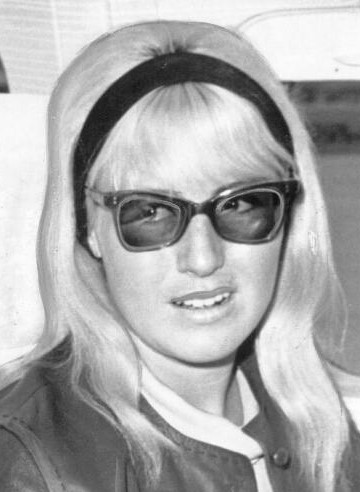 Since John Lennon was quoted as saying the song was "semi-autobiographical," it's not too much of a stretch to say that the lyrics here are depicting the contemplation of turning one of his adulterous affairs into a replacement of his wife Cynthia in his life. Within the lyrics he makes excuses for this by finding fault with how Cynthia is treating him, such as by intimating that she doesn't love him very much ("I must be sure...that you would love me more than her") and that he is mistreated by her in some way ("Don't hurt my pride like her, 'cause I couldn't stand the pain"). Since John Lennon was quoted as saying the song was "semi-autobiographical," it's not too much of a stretch to say that the lyrics here are depicting the contemplation of turning one of his adulterous affairs into a replacement of his wife Cynthia in his life. Within the lyrics he makes excuses for this by finding fault with how Cynthia is treating him, such as by intimating that she doesn't love him very much ("I must be sure...that you would love me more than her") and that he is mistreated by her in some way ("Don't hurt my pride like her, 'cause I couldn't stand the pain").
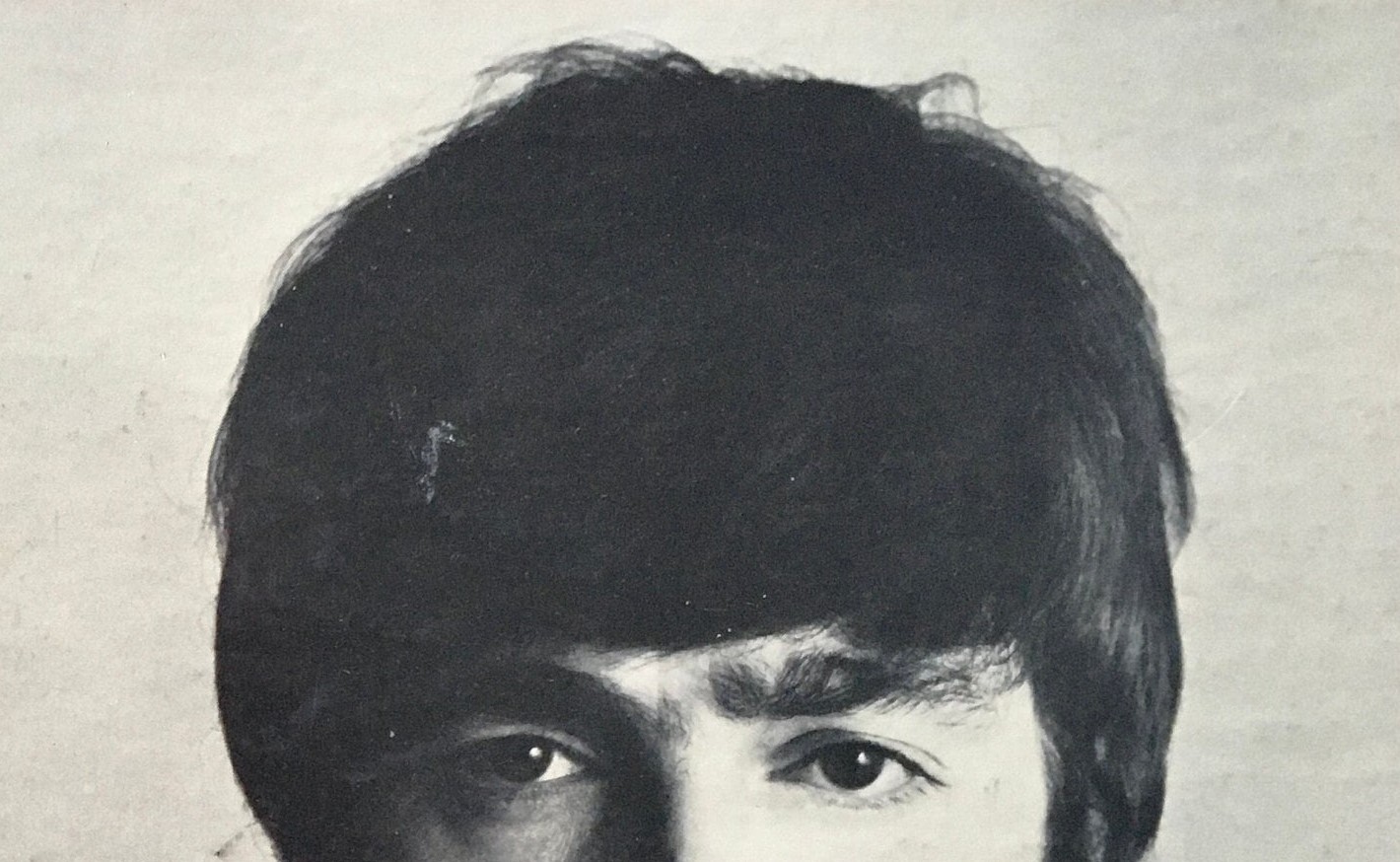 In essence, what John is saying is that he wants to leave his wife for this new love, but only if she promises "to be true," because it would be at great cost to make this big change. After all, "she will cry when she learns that we are two," bringing Cynthia great pain too. It's interesting to note as well that the love interest John is singing to is very aware of his being married and that he is still in love with his wife ("if I love you too"), otherwise he wouldn't be telling her this whole story with such openness. In essence, what John is saying is that he wants to leave his wife for this new love, but only if she promises "to be true," because it would be at great cost to make this big change. After all, "she will cry when she learns that we are two," bringing Cynthia great pain too. It's interesting to note as well that the love interest John is singing to is very aware of his being married and that he is still in love with his wife ("if I love you too"), otherwise he wouldn't be telling her this whole story with such openness.
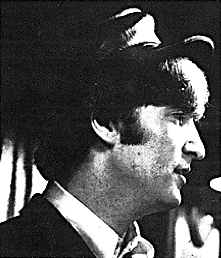 Lennon's sincerity comes through convincingly here as a result of the heart-wrenching lyrics in juxtaposition with the dual melody lines and chord changes. His pleading, as in his repeating "oh please" in the second verse, displays John desperately wanting this change in situation to occur. Lennon's sincerity comes through convincingly here as a result of the heart-wrenching lyrics in juxtaposition with the dual melody lines and chord changes. His pleading, as in his repeating "oh please" in the second verse, displays John desperately wanting this change in situation to occur.
The only awkwardness lyrically appears in the transition from the third verse to the repeated bridge where he shifts the resulting "pain" he feels to the thought of his own hurt "pride" in the first bridge to the "pain" of his current love interest learning that he and his new love interest were now together, or "two." Follow me?
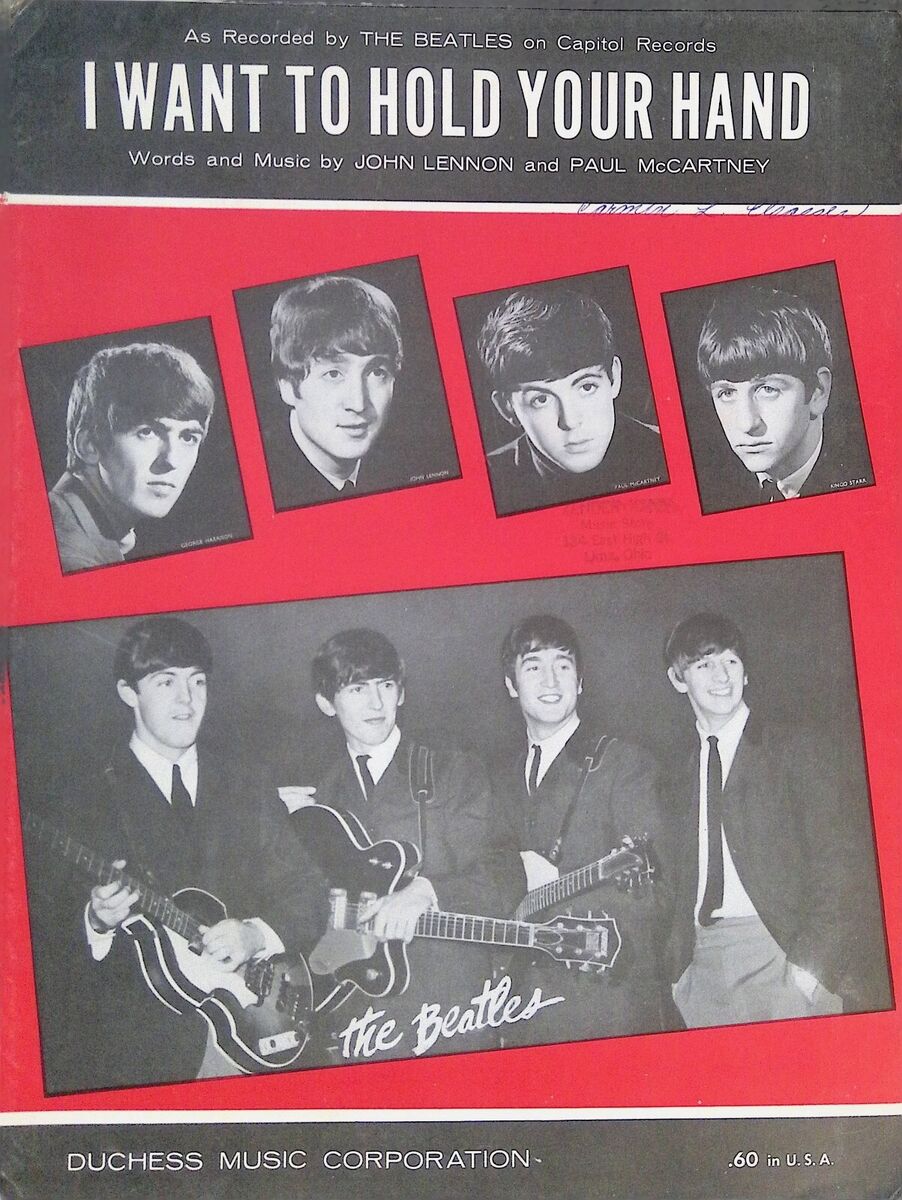 Beatles enthusiasts should be very interested to notice (if they hadn't already) that by the time this song was written in January of 1964, Lennon no longer thought 'holding hands' was the ultimate goal in a relationship as depicted in their current #1 hit "I Want To Hold Your Hand." "If I Fell" explains: "I've found that love was more than just holding hands." It may be Lennon's "coming to maturity" lyrically that led him to possibly insert this personal "jab" into this song. Beatles enthusiasts should be very interested to notice (if they hadn't already) that by the time this song was written in January of 1964, Lennon no longer thought 'holding hands' was the ultimate goal in a relationship as depicted in their current #1 hit "I Want To Hold Your Hand." "If I Fell" explains: "I've found that love was more than just holding hands." It may be Lennon's "coming to maturity" lyrically that led him to possibly insert this personal "jab" into this song.
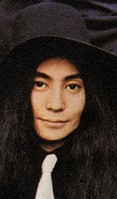 Ironically, Lennon did succumb to the temptation depicted in these lyrics in real life in 1968 when his obsession-turned-affair with Yoko Ono resulted in the exact situation that he contemplated in the lyrics to "If I Fell" four years earlier. Listening to the song as if Lennon is singing to Yoko puts an ironic spin on the song, making it seem ever more realistic. Ironically, Lennon did succumb to the temptation depicted in these lyrics in real life in 1968 when his obsession-turned-affair with Yoko Ono resulted in the exact situation that he contemplated in the lyrics to "If I Fell" four years earlier. Listening to the song as if Lennon is singing to Yoko puts an ironic spin on the song, making it seem ever more realistic.
American Releases
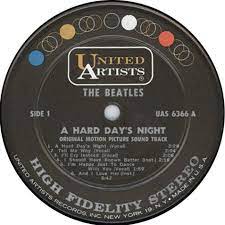 American music fans first heard "If I Fell" on the June 26th, 1964 released United Artists "A Hard Day's Night" soundrack album. This LP was rush-released by the label to beat Capitol Records to the top of the album charts, which it did, becoming the fastest selling album of all time (up until then). Since United Artists were eager to release this album as soon as possible, and they only had the mono mixes sent by EMI as of around June 10th, 1964, the label created a "High Fidelity Stereo" version utilizing the mono mixes that they had. After transferring the mono master to two seperate channels and boosting the bass frequencies in the left channel and boosting the treble frequencies in the right channel, they raised the volume of the first verse in the left channel and lifted the volume of the right channel during the closing measures of the song. Very sneaky! American music fans first heard "If I Fell" on the June 26th, 1964 released United Artists "A Hard Day's Night" soundrack album. This LP was rush-released by the label to beat Capitol Records to the top of the album charts, which it did, becoming the fastest selling album of all time (up until then). Since United Artists were eager to release this album as soon as possible, and they only had the mono mixes sent by EMI as of around June 10th, 1964, the label created a "High Fidelity Stereo" version utilizing the mono mixes that they had. After transferring the mono master to two seperate channels and boosting the bass frequencies in the left channel and boosting the treble frequencies in the right channel, they raised the volume of the first verse in the left channel and lifted the volume of the right channel during the closing measures of the song. Very sneaky!
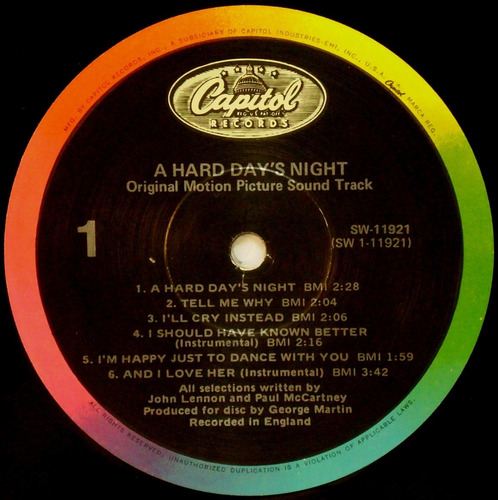 United Artists kept this LP in print until the label was bought by Capitol Records in 1978, Capitol beginning their reprints of the soundtrack album on August 1st, 1980. This American soundtrack album got its CD release on January 21st, 2014, both the mono and stereo versions of the LP being contained on a single disc. United Artists kept this LP in print until the label was bought by Capitol Records in 1978, Capitol beginning their reprints of the soundtrack album on August 1st, 1980. This American soundtrack album got its CD release on January 21st, 2014, both the mono and stereo versions of the LP being contained on a single disc.
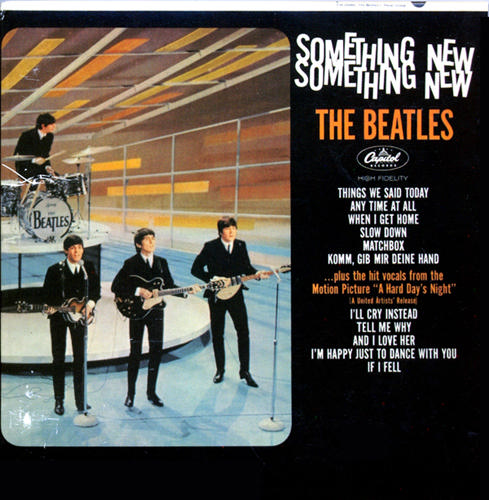 July 20th, 1964, saw Capitol Records get their soundtrack-related album "Something New" out to the public, which contained "If I Fell" in full stereo for the first time, vocal flaws and all. The album couldn't get past the #2 spot on the Billboard album chart because of the United Artists soundtrack album at #1. "Something New" was released on compact disc as well, this happening on January 21st, 2014 and also containing both the mono and stereo versions of the original LP on a single disc. July 20th, 1964, saw Capitol Records get their soundtrack-related album "Something New" out to the public, which contained "If I Fell" in full stereo for the first time, vocal flaws and all. The album couldn't get past the #2 spot on the Billboard album chart because of the United Artists soundtrack album at #1. "Something New" was released on compact disc as well, this happening on January 21st, 2014 and also containing both the mono and stereo versions of the original LP on a single disc.
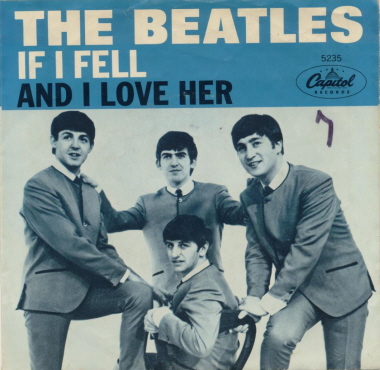 Also released on this day was the second of two singles Capitol chose to simultaneously release, which was "And I Love Her" backed by "If I Fell." While the a-side peaked at #12, "If I Fell" received its own placement at a respectable #53 on the Billboard Hot 100. Also released on this day was the second of two singles Capitol chose to simultaneously release, which was "And I Love Her" backed by "If I Fell." While the a-side peaked at #12, "If I Fell" received its own placement at a respectable #53 on the Billboard Hot 100.
Apart from a small snippet of the song being included in the track "Beatles Will Be Beatles" on the November 1964 released documentary album "The Beatles' Story" (this Capitol album also being released on CD on January 21st, 2014 as part of the box set "The US Albums"), the next release of the song was not until October 21st, 1977 on the Capitol compilation album "Love Songs." This double album continued the pattern of Beatles compilation albums intended to capitalize on the resurgence of Beatlemania in the late '70s. This one only peaked at #24 on the Billboard album chart, which was somewhat less successful than its predecessor "Rock 'n' Roll Music."
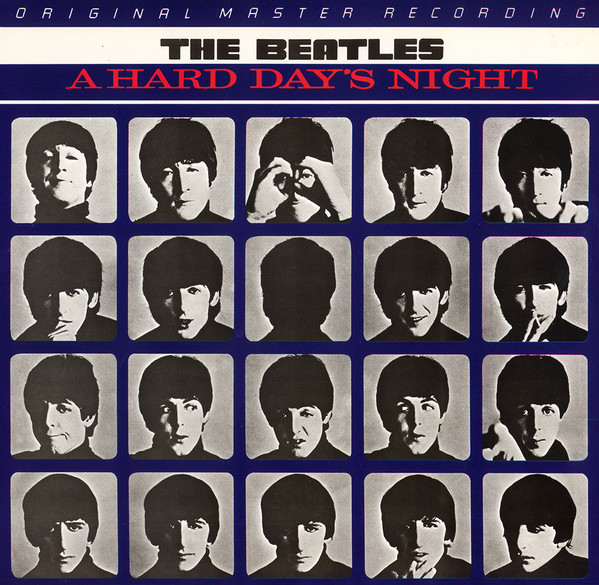 The first time the original UK "A Hard Day's Night" album was made available in America was on the "Original Master Recording" vinyl edition released through Mobile Fidelity Sound Lab in February of 1987. This LP included "If I Fell" and was prepared utilizing half-speed mastering technology from the original master tape on loan from EMI. This version of the album was only available for a short time and has come to be viewed as quite collectible today. The first time the original UK "A Hard Day's Night" album was made available in America was on the "Original Master Recording" vinyl edition released through Mobile Fidelity Sound Lab in February of 1987. This LP included "If I Fell" and was prepared utilizing half-speed mastering technology from the original master tape on loan from EMI. This version of the album was only available for a short time and has come to be viewed as quite collectible today.
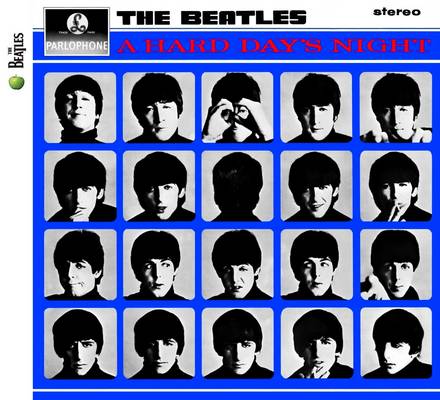 February 26th, 1987 was the date that the US finally saw the "A Hard Day's Night" album in its intended form on compact disc, a vinyl edition coming out on July 21st, 1987. While this album was only available in mono, the remastered edition released on September 9th, 2009 on compact disc was in stereo, the vinyl version coming out on November 13th, 2012. February 26th, 1987 was the date that the US finally saw the "A Hard Day's Night" album in its intended form on compact disc, a vinyl edition coming out on July 21st, 1987. While this album was only available in mono, the remastered edition released on September 9th, 2009 on compact disc was in stereo, the vinyl version coming out on November 13th, 2012.
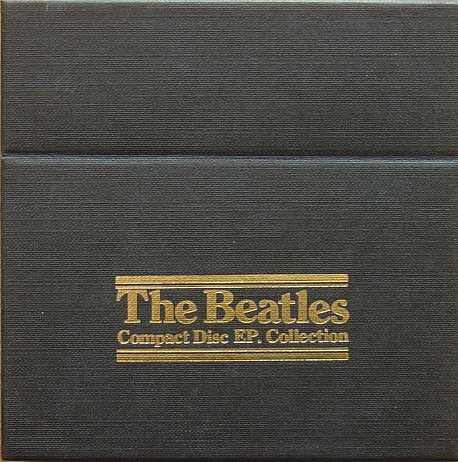 On June 30th, 1992, Capitol released a box set called “Compact Disc EP Collection” which contained the mono mix of “If I Fell” because of its inclusion on the original British EP “Extracts From The Film A Hard Day’s Night.” On June 30th, 1992, Capitol released a box set called “Compact Disc EP Collection” which contained the mono mix of “If I Fell” because of its inclusion on the original British EP “Extracts From The Film A Hard Day’s Night.”
The box set entitled "The Capitol Albums, Vol. 1," which contained both the mono and stereo version of "If I Fell" as originally heard on "Something New," came out on November 15th, 2004. Just prior to this release, a rare promo CD sampler was released that featured both the contrasting stereo and mono mixes of the song.
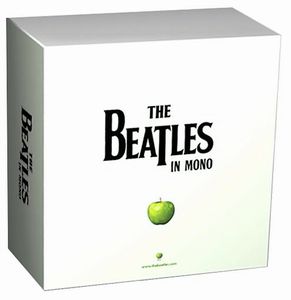 On September 9th, 2009, a CD box set called “The Beatles In Mono” was released that contained the mono mix newly remastered. Also coming out on that day, in promotion of the remastered Beatles catalog, the "09.09.09 Sampler" was distributed to many retailers and radio programmers, "If I Fell" being featured therein. The vinyl edition of this box set came out on September 9th, 2014. On September 9th, 2009, a CD box set called “The Beatles In Mono” was released that contained the mono mix newly remastered. Also coming out on that day, in promotion of the remastered Beatles catalog, the "09.09.09 Sampler" was distributed to many retailers and radio programmers, "If I Fell" being featured therein. The vinyl edition of this box set came out on September 9th, 2014.
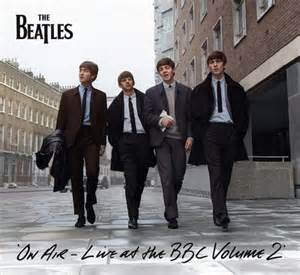 November 11th, 2013 saw the release of the album "On Air - Live At The BBC Volume 2" featuring a newly recorded version of "If I Fell" for the British radio program "Top Gear." July 14th, 1964 was the recording date for this session which even included John double-tracking his vocals. November 11th, 2013 saw the release of the album "On Air - Live At The BBC Volume 2" featuring a newly recorded version of "If I Fell" for the British radio program "Top Gear." July 14th, 1964 was the recording date for this session which even included John double-tracking his vocals.
In promotion of the 2014 released box set "The US Albums," a 25-song sampler CD was manufactured for limited release on January 21st, 2014, this containing the stereo mix of "If I Fell."
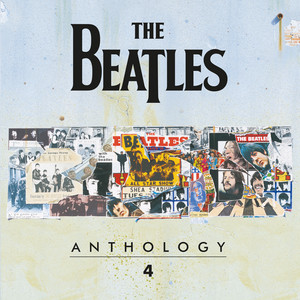 On November 21st, 2025, "Anthology 4" was released on both CD and vinyl, this album also being made available within the "Anthology Collection" box set on CD and on vinyl. "Take 11" of "If I Fell" as recorded at EMI Studio Two on February 27th, 1964, as detailed above, was included on this release. On November 21st, 2025, "Anthology 4" was released on both CD and vinyl, this album also being made available within the "Anthology Collection" box set on CD and on vinyl. "Take 11" of "If I Fell" as recorded at EMI Studio Two on February 27th, 1964, as detailed above, was included on this release.
Live Performances
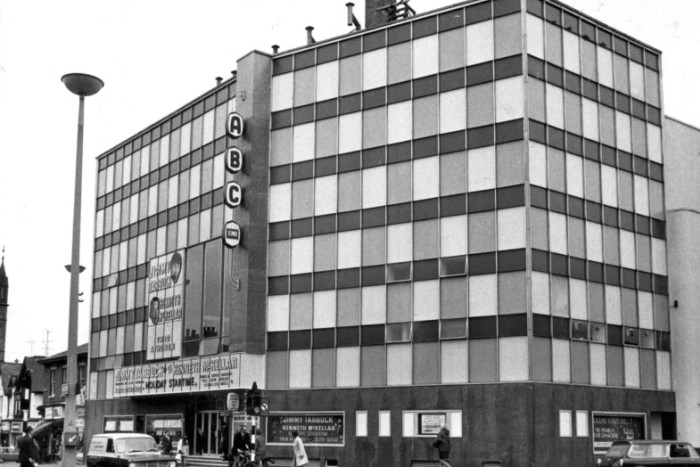 John and Paul must have been especially proud of this song, being that they thought to include it quite prominently in their live shows throughout the latter half of 1964. John and Paul must have been especially proud of this song, being that they thought to include it quite prominently in their live shows throughout the latter half of 1964.
British TV got a taste of the song on the live programme "Blackpool Night Out," this being the summer version of the very popular "Big Night Out" TV show. The program aired live on July 19th from ABC Theatre in Blackpool and featured The Beatles performing five songs and starring in comedy sketches.
 August 19th saw The Beatles starting their first American tour at the Cow Palace in San Francisco, California. Their 25 date concert tour, with the song "If I Fell" being featured throughout, hit many US hot spots, such as Las Vegas, Nevada, the Hollywood Bowl in Los Angeles, Red Rocks Amphitheater in Denver, Colorado, the Olympia Stadium in Detroit, three Canadian dates and finally Dallas, Texas on September 18th. Interestingly, in order to add some punch to the performance of the song, Ringo opted to incorporate his trademark hi-hat sizzle (such as throughout the song "A Hard Day's Night") to the final verse. August 19th saw The Beatles starting their first American tour at the Cow Palace in San Francisco, California. Their 25 date concert tour, with the song "If I Fell" being featured throughout, hit many US hot spots, such as Las Vegas, Nevada, the Hollywood Bowl in Los Angeles, Red Rocks Amphitheater in Denver, Colorado, the Olympia Stadium in Detroit, three Canadian dates and finally Dallas, Texas on September 18th. Interestingly, in order to add some punch to the performance of the song, Ringo opted to incorporate his trademark hi-hat sizzle (such as throughout the song "A Hard Day's Night") to the final verse.
 October 9th saw the beginning of the highly-anticipated British tour, which also included the song "If I Fell." This tour included Bradford, London, Liverpool, Brighton and three nights in Scotland before concluding at the Colston Hall in Bristol on November 10th. By this time their next album "Beatles For Sale" was being prepared for release, so they diverted their attention to songs on that album, retiring "If I Fell" from their repertoire forever. October 9th saw the beginning of the highly-anticipated British tour, which also included the song "If I Fell." This tour included Bradford, London, Liverpool, Brighton and three nights in Scotland before concluding at the Colston Hall in Bristol on November 10th. By this time their next album "Beatles For Sale" was being prepared for release, so they diverted their attention to songs on that album, retiring "If I Fell" from their repertoire forever.
Conclusion
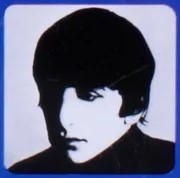 Since the decision was made early on that none of The Beatles would have a girlfriend in the film "A Hard Day's Night" (which made them appear more accessible to female fans), they had to come up with a way to fit this love song into the film. The premise the writers came up with was for Lennon to sing "If I Fell" to Ringo. "We are in the television studio and Ringo is supposed to be sulking a bit," McCartney explains. "John starts joking with him and then sings the song as though we're singing it to him. We got fits of the giggles just doing it." The ludicrousness of this idea is quite apparent when viewing this scene in the film with John going into his "spastic" bit during the song's introduction on the word "understand." Since the decision was made early on that none of The Beatles would have a girlfriend in the film "A Hard Day's Night" (which made them appear more accessible to female fans), they had to come up with a way to fit this love song into the film. The premise the writers came up with was for Lennon to sing "If I Fell" to Ringo. "We are in the television studio and Ringo is supposed to be sulking a bit," McCartney explains. "John starts joking with him and then sings the song as though we're singing it to him. We got fits of the giggles just doing it." The ludicrousness of this idea is quite apparent when viewing this scene in the film with John going into his "spastic" bit during the song's introduction on the word "understand."
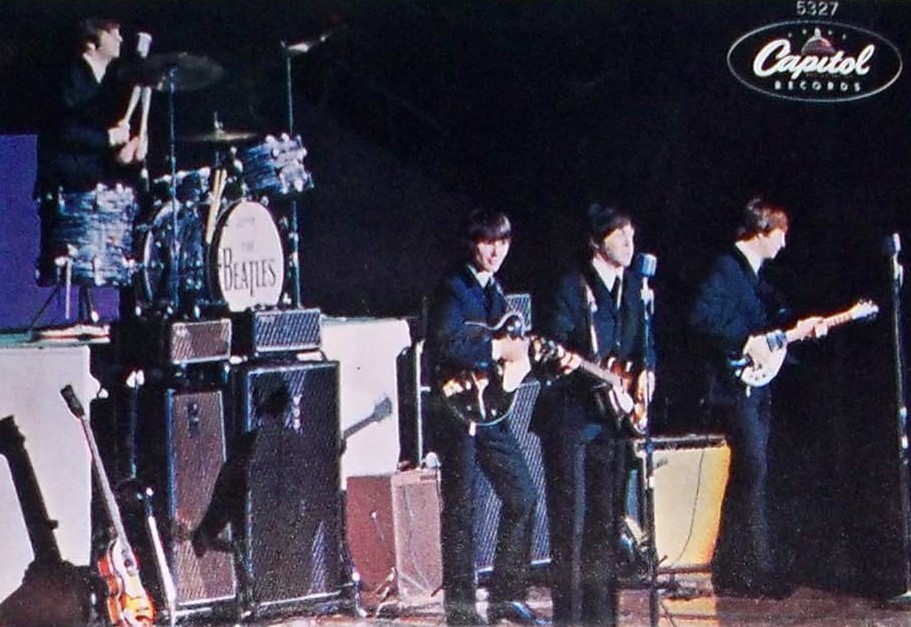 The lyrical seriousness of this song may have been underplayed by the group during its performance in the movie, but The Beatles were quite proud of this composition. Proud enough to pick it out among all the soundtrack songs and perform it live every chance they got in the second half of 1964. And they had the interweaving vocals down to a tee for each performance. They definitely knew when they had something good. The lyrical seriousness of this song may have been underplayed by the group during its performance in the movie, but The Beatles were quite proud of this composition. Proud enough to pick it out among all the soundtrack songs and perform it live every chance they got in the second half of 1964. And they had the interweaving vocals down to a tee for each performance. They definitely knew when they had something good.
Song Summary
"If I Fell"
Written by: John Lennon / Paul McCartney
-
Song Written: January 1964
-
Song Recorded: February 27, 1964
-
First US Release Date: June 26, 1964
-
-
-
Highest Chart Position: #53
-
-
Length: 2:22
-
Key: D major
-
Producer: George Martin
-
Engineers: Norman Smith, Richard Langham
Instrumentation (most likely):
- John Lennon - Lead Vocals, Rhythm Guitar (1962 Gibson J160E)
- Paul McCartney - Harmony Vocals, Bass Guitar (1963 Hofner 500/1)
- George Harrison - Lead Guitar (1963 Rickenbacker 360-12 Fire-glo)
- Ringo Starr - Drums (1963 Ludwig Downbeat Black Oyster Pearl)
Written and compiled by Dave Rybaczewski
|
IF YOU WOULD LIKE TO MAKE A DONATION TO KEEP THIS WEBSITE UP AND RUNNING, PLEASE CLICK BELOW!
|